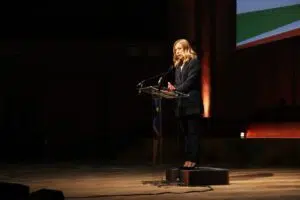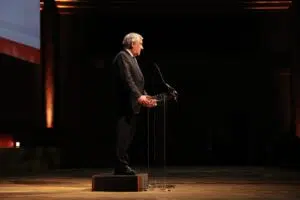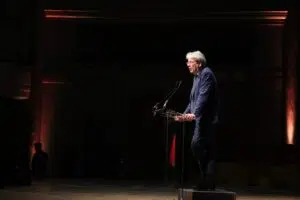Brussels – The first time was in 2017, under Paolo Gentiloni. Almost seven years later, Giorgia Meloni‘s government is relaunching Italy’s General States in Brussels, the summit of representatives of Italian institutions and business organizations in the heart of the European Union. “Talking about one’s point of view in Brussels helps us remember that the team we are part of is called Italy, and each one makes a difference,” Premier Meloni opened the event this afternoon (March 22) in an impassioned speech just after the European Council had ended. “Look around yourself; we are not alone in our victories or defeats; we all work for the same team.”

Competitiveness, defence, global challenges. In relaunching Italy’s States General in Brussels, Meloni called the initiative “a practice to confront ourselves” and line up priorities to “dare, not just diligently plough a road opened by others.” Words confirmed by the Deputy Prime Minister and Foreign Minister, Antonio Tajani, in doing the honours: “If we want to count more, we have to coordinate better,” because “80 per cent of the norms approved by the parliament are a transformation of EU norms into Italian law; it is fundamental to act here and be present and coordinated.” Beginning with one of the issues most felt by Rome in recent months and which found its way into the discussions on the second day of the European Council: “Agriculture faces a systemic crisis” on which “we cannot fail to seek concrete solutions,” remarked Meloni, claiming the reference, in the conclusion, on the “ability to extend the framework on state aid.”

Deputy Prime Minister and Foreign Minister Antonio Tajani, at the States General of Italy in Brussels, March 22, 2024 (credits: Simone De La Feld)
This topic occupied a significant space in the Italian Prime Minister’s speech, with reference also to “the problems that Europe’s founding fathers had glimpsed when they envisioned the Common Agricultural Policy.
“If the objectives of the CAP “remain the same,” it is “the tools that need to be adapted to a changing context,” given the fact that “production prices continue to rise and purchase costs to fall.” While keeping in mind that “the agri-food chain is fundamental in strategic supply chains for sovereignty,” Meloni goes on to claim the need to revise the Common Agricultural Policy, starting with an EU Commission proposal that “is going in the right direction also thanks to many of our proposals.” After “difficult but important” discussions among the 27 EU leaders, the work continues with a request to the von der Leyen cabinet to present “an assessment to the European Council in April; it will be work for the coming weeks.”

European Economy Commissioner Paolo Gentiloni at Italy’s Stati Generali in Brussels, March 22, 2024 (credits: Simone De La Feld)
Weaving the threads of the speech was the very first organizer of the States General in Brussels, Commissioner Gentiloni: “I am one of the few to have been privileged to have been present in the last meeting as prime minister as well, that final ‘goodbye’ from Meloni was very important,” referring to the premier’s invitation to renew the Italian appointment in the heart of the Union “soon.” Cabinet member von der Leyen spoke first about European competitiveness’s present and near future, recalling the importance of the two reports on competitiveness and the Internal Market, prepared by two former Italian prime ministers (Mario Draghi and Enrico Letta, respectively). “Until now, we have had three major pillars” for European competitiveness: “cheap gas from Russia, security from the Americans, and an unlimited horizon for exports to China.” However, “these three pillars in different ways have all cracked,” although this “does not mean that globalization is dead, but that the issue of our “sovereignty,” the capacities of supply chains and securing the European economy is fundamental.” Discourses, however, that “could be weakened” in the face of the risks of the European elections in June: “In many countries, it will not be easy to reach a 50 per cent turnout; if we don’t have a good participation result, we will all be weakened.” That is why Gentiloni’s appeal is “Vote and get people to vote.”
English version by the Translation Service of Withub





